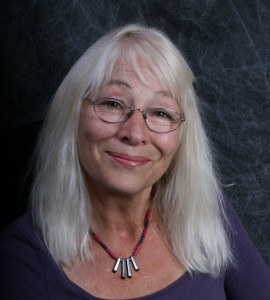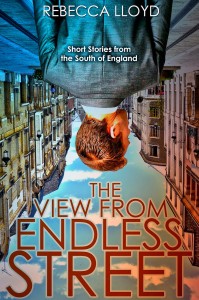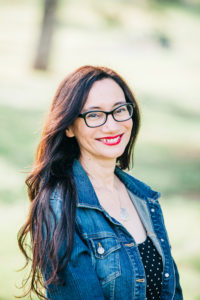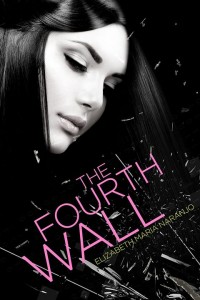I am so pleased to have author Rebecca Lloyd visit with me today on her blog tour. Rebecca and I share a publisher, WiDo Publishing, and I’m a little in awe after reading her short story collection The View from Endless Street: Short Stories from the South of England. It’s a wonderful book filled with gorgeous writing and quirky characters and…well, check out the blurb below. After that, read my interview with Rebecca and leave her a comment–she’ll be popping in from England and wants to hear from you!
About the Book:
With this collection of short stories set in the south of England and beyond, Rebecca Lloyd explores relationships and the brave or foolish things they can make people do. These stories about murder and ghosts, delusion and desperation, obsession and arson, show readers a sometimes sweet, sometimes macabre vision of humanity. Rebecca Lloyd channels Roald Dahl’s wit and flair for the unexpected in this collection that will appeal to the quirky side of the literary reader.
The View from Endless Street is available in print and in ebook format:
To order from WiDo Publishing, click here.
To order the Kindle version from Amazon, click here.
To order from Barnes and Noble, click here.
Don’t forget that if you own an e-reader, you can sample The View from Endless Street for free. The free sample allows you to read Rebecca Lloyd’s award-winning short story, The River, in its entirety. So you have nothing to lose by giving it a try, and I can almost guarantee you’ll want to read more. 😉
About the Author:
Rebecca Lloyd lives in the city of Bristol in the South West of England. She has two daughters and three grandsons. Apart from fiction writing, she works as a writing tutor and editor. She won the Bristol Short Story Prize in 2008 for a single story – The River, and in 2010 was a semi-finalist in both the Hudson Prize for a short story collection and the Dundee International Book Prize for a novel. In 2014, she was shortlisted in the first annual Paul Bowles Award in Short Fiction. She is the author of Halfling, (Walker Books 2011), and co-editor of the anthology Pangea, (Thames River Press 2012).
Rebecca is on Goodreads and Facebook.
Elizabeth: You write on your blog that it’s easy for writers to fall out of the habit of writing and that it can take “a huge effort to get back into it.” Can you tell us about your own writing habits?
Rebecca: Well, when I had to work for a living, I’d get up at around 5am, or sometimes earlier because I liked to watch the dawn, and I’d write until 8am and then do my day’s work. Now that I don’t work, my routine is a great deal less rigorous, I get up at around 7.30am and I’m at my desk by 8am. I work until lunchtime and then after that, the rest of the day can start. I try to stop writing when I sense my brain is getting tired, you know, like when you’re starting to write lame dialogue. If that happens I know it’s time to leave the computer, but I make a note alongside the text which would say something like ‘would she really have said those words under the circumstances?’ The next day, I can get back to it and deal with it.
I try not to open my emails or do any social networking stuff before I’ve done my morning’s writing. In the afternoon, I might still be very engrossed with the emerging story and so I carry a notebook with me wherever I’m going, as ideas might suddenly arise in my thinking, or structural issues might solve themselves in my head, and I would need to make a note about it.
I think the important thing is that I’ve trained myself over many years to put fiction writing first before all other matters, and I guess it must be because I write every morning that I’m thought of as a prolific writer. But as I live alone, I do have the freedom to make choices like that. I always say to student writers that they must fight for or negotiate for their writing time with partners and family, and stay strong about it.
Elizabeth: Which authors in particular inspired you?
Rebecca: I enjoy some writers and marvel at others, but authors don’t inspire my own work, rather the curious behaviour of my fellow humans inspires my work.
But of the writers I read and admire, Walter de la Mare comes right up at the top, but it’s true that he can become so obscure that it’s impossible to understand him sometimes, but otherwise he’s glorious. I’m very fond of Robert Aickman; he is a fine writer of the creepy stuff. And Jane Bowles is another favourite, she was the wife of Paul Bowles who is a better known writer than Jane. A.L Barker is a very exciting and peculiar writer as well. John McGahern is also a wonderful writer; I’d recommend his book Creatures of the Earth.
Elizabeth: Do you plow through your first drafts, and then go back to refine them? Or do you edit as you go along?
Rebecca: Yes, I tend to carry straight on with a story and not stop to improve it as I work, although I might leave myself messages, particularly if I have to research something, when doing the research right then and there would break the flow. Of course there are writers who perfect each sentence as they go along, but I would be afraid for them that they might lose the bigger picture, or the mood, or the tempo of the story by working like that. I think it’s more practical to try to get the story down from start to finish and then in as many other drafts as it takes, perfect it. I even write out what is going to happen in the story at the top of the page these days before I begin so I can look back and remind myself of the storyline again.
Elizabeth: You’ve published both novels and short fiction. Do you prefer one over the other?
Rebecca: I prefer writing short stories. I have written a few novels, one that does the rounds repeatedly but can’t find a publisher yet, and another, Halfling, which was published by Walker Books and is for nine to thirteen year olds. I confess to having other finished novels in ‘drawers,’ and they will probably never come out now. Short story seems to be my natural writing place, but it’s good to know how to do both, particularly if, like me, you teach writing because a lot of students want to write novels, so the tutor’s experience of novel writing is valuable.
Elizabeth: What are some unique challenges in writing short stories?
Rebecca: One of them might be developing the ability to leave out anything which has no immediate bearing on the story; sometimes it’s tempting to add small touches or moments that ultimately don’t add anything to the whole, but that skill of discernment eventually just comes instinctively. I suspect the same thing might not be essential in the writing of a novel in which there is space and room to put in quite a lot that’s not exactly to the point.
Another challenge might be, well, the simple fact of finding a story good enough to write in the first place. I always say that if you think you’ve found a good story, whatever its source, newspaper article, incident on the street, historical moment, personal experience of something, make sure you do capture it in words because there aren’t that many interesting stories to be had… but as I say that, I’ve got to concede that it might be that there are times in our lives as story writers when we are deeply attuned to what’s going on and we can see stories all around us, and then at other times the stories just don’t seem to present. It’s a state of mind, but it’s one that requires conscious nurturing.
Elizabeth: One thing that’s striking about your work is that you don’t draw attention to the strangeness of your characters’ situations. The surreal elements are subtly woven in, giving them much more power. Is it difficult to show restraint and resist the need to explain/describe everything?
Rebecca: I have to confess that I didn’t really know my writing was at all strange until this year with WiDo Publishing likening me to Roald Dahl and Tartarus Press, who only publish weird fiction, taking me on and publishing another story collection of mine called Mercy. And that’s a case in point, the story ‘Mercy’ was based on the real life of a man who was in love with a …corpse. As the story is told through his eyes, he wouldn’t find his situation in the least bit strange. His concern is keeping the corpse from falling apart. But that story is also a commentary on the relationship between men and women in the world, as well as being a love story in its own right. Then, the story that you mentioned earlier on – The Snow Room – I feel there isn’t anything that couldn’t have happened in real life in that story either, and the male character, Bernie, is based on a very nervous man who came to stay in my house in Africa for a couple of days, and who had a lot of Bernie’s behaviours. That’s a good example of how keeping a writer’s notebook is so very valuable, because I didn’t invent the Bernie character in The Snow Room until maybe a decade after I left Africa.
But you ask is it difficult to resist the need to explain? No, not in the slightest, all that is needed in order not to go down the road of explaining anything is that you have complete faith in your story and confidence in your writing, and crucially, belief in your readers’ intelligence. Beginner writers quite often do have to battle with exposition, and some understand it very quickly and others take a while to know when a paragraph or phrase is exposition. I always say that writers are just like actors, even if you’re writing in the third person. So if you were on stage ‘being’ a character, you wouldn’t have moments when you explained to the audience what you were doing. You’d expect them to do the work necessary in order to understand your character. Exactly the same with writing.
Elizabeth: You teach fiction writing–what’s the one thing you most want your students to take away from your class?
Rebecca: Only this, the determination to continue writing against all the odds if that’s what it takes. A writing course can set you up with some good writing practices and some useful tips, things that you might have taken a long time to find out by yourself. But after that, a writer must have passion, discipline and self-belief. I sometimes see moments on my students’ faces when they come to realise that writing is a real dedication that requires genuine commitment, when in the first couple of sessions they had supposed that learning to write fiction would be like learning to make jewellery. I sometimes see my ex-students in the street and I hesitate to ask the question ‘are you still writing?’ I don’t want them to say no, but fear they will.
Elizabeth: Coffee or tea?
Rebecca: Coffee, strong, black and scalding, I’m going to make it now.
Join Rebecca tomorrow for her next stop on the blog tour! And today she’s hanging around HERE to answer questions, so leave a comment and start a conversation. I assure you, she is lovely to talk to. 🙂















Elizabeth, thank you so much for hosting me on your blog and interviewing me. I am happy to answer any questions about this book, or my second one published at the same time called Mercy, and published by Tartarus Press. Or, I’d be happy to answer any questions in general about the writing process; I think sometimes people imagine that writers are a bit different from other folk, especially when a writer says, emphatically, that they’d always wanted to write ever since they were a child. I think that statement can make people feel as if writing isn’t something they could ever do. Well, I started writing at the age of 45 and was inspired by the comings and goings of an isolated village I lived in in Tanzania where I was working in a hospital.
That is inspiring to know that you’ve had such success and you only started writing at 45! My friend Linda Pressman got a late start as well, and she also proved to be a talented author, writing an award-winning memoir. Hopefully she’ll drop in today and visit. 🙂
The writing life is a terrific life for the second part of your existence, I think, because so much of the world has failed to make any sense by then and so it becomes more and more fascinating to see how people and groups and so forth behave.
Thank you Elizabeth and Rebecca for a wonderful conversation. I always enjoy learning more about writers. I think that it’s a secret dream of mine to write and publish. Great inspiration here.
Interesting questions asked and intriguing responses. Elizabeth, I thoroughly enjoyed reading your interview with Rebecca Lloyd. She has a refreshingly freestyle, but disciplined life style, that I found fascinating. She is well versed and has many world traveled experiences that serve as a solid foundation for her writing. Thank you Elizabeth and Rebecca.
This is a wonderful and insightful interview. Thank you both. I am curious about Rebecca’s take on the differences in writing for a young audience as opposed to an adult audience.
Hi Yolande,
today I’ll running a creative writing workshop at the Swindon Literary Festival, and my main topic will be busting the myths about writers, because I believe that the slight ‘separateness’ that writers are accorded acts to stop people feeling that they too could be a writer and certain of these myths also mislead people about the true nature of a writing life. I’m hoping that the people who attend will also tell me about other myths that I haven’t heard about. What a pity that you couldn’t be there because I’d want to explore with you why your dream to write must be secret… oh, but you could tell me here?
Hi David, and thank you for reading the blog and commenting, it is much appreciated!
Hello Heidi,
I guess there might be a few differences between writing a novel for young people, particularly children, and adults and the first one that comes to mind is that for children you wouldn’t create a complex structure through which to tell your story, and so in some respects the novel would be a more simple one. Although that would not necessarily make it easier overall to write… for example you would have to find a way of constantly remembering that your readers’ grasp on life and the world is different from that of an adult, so you wouldn’t have the ‘freedom’ exactly to write as the words come to you as though speaking to one of your contemporaries. I understand that getting a child’s or young person’s book published isn’t at all easy as the publishers are very vigilant about all aspects of such a book. I’m sure Elizabeth has ideas about this having written The Fourth Wall, but when I wrote Halfling published by Walker Books for 9 to 13 year olds, it just happened that I slotted right into the character of the boy who speaks the story, as if he had always been in me… but oops! that makes it sound a bit magic and it isn’t really, it’s just concentration and remembering that essentially, writers are very similar to actors.
Hello Rebecca,
What a very nice interview, once again, Becca. Loved your answer to the question about resisting the temptation to explain your characters and their strange situations.
Also appreciate the opportunity to meet Elizabeth through her blog on your blog tour.
Indira
Thank you Indira. I enjoyed the interview on your blog too, particularly the insight on The Oil Drum. Great questions!
hi Indira, good that you dropped by!
hi Judy, I don’t have much time for the idea of books about writing and I’ve never read any, but there was one called ‘The Artists’ Way’ or something like that that quite a few people tend to mention. Someone once said that I should make my teaching course into a book, but I can’t quite find the enthusiasm. Anyway, from what Elizabeth has just said, sounds like maybe you don’t really need to read a book like that anyway!
If you do buy my book, thank you, Judy. There is a hidden story in it, [it was a kind of accident really, but it’ll surprise you when you come across it].
Thank you both , Elizabeth and Rebecca,
I am always in awe of writers who complete a book, as you both have. I appreciate Rebecca’s insight about how you must do your work. It reminds me of the advice of Anne Lamott in her book on writing.
I’m wondering if either of you have books on writing you like and would recommend.
Thanks again. I look forward to reading Rebecca’s book.
Thanks Judy. Let me just take this opportunity to shout out that you’re a fantastic writer. I still think about your beautiful Christmas story.
Hm, I’d love to be original here, but I’ll just be honest–my favorite book on writing is Stephen King’s On Writing. If you haven’t read it, you definitely should! Thanks for asking. 🙂